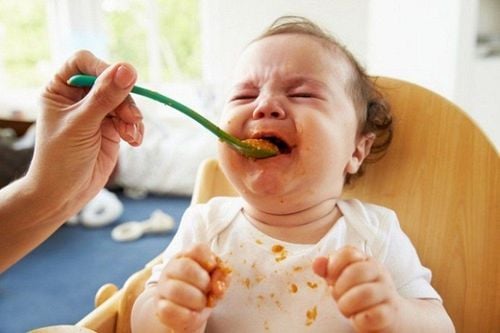This is an automatically translated article.
“Why does the baby refuse to chew and swallow” and “what to do if the baby refuses to chew food but swallows” are questions that many parents are interested in. Let's refer to the article below to understand more about the reasons why babies refuse to chew and swallow and effective solutions to help children change this habit.
1. Why does the baby refuse to chew and swallow?
Chewing food is a complex process that babies begin to learn gradually from the age of 6 months, it includes a complex sequence of movements of the jaw and tongue muscles. Babies often practice chewing in stages, first using their tongue and upper jaw to crush food, then using their tongue to move food to the left and right and using their gums to grind.
Like any other new skill, chewing depends on the experiences and skills your baby has learned in the previous months.
The practice of chewing can start around 6-9 months. This period is an important opportunity to start with the introduction of textured foods (purified foods, solids).
Here are some common reasons why rumination becomes a problem for toddlers:
Late introduction of solids: Baby's inability to chew can be due to late solids (later 6-8 hours) month). In this case, the optimal development of motor skills such as chewing may be delayed. Your baby may have trouble accepting a new solid or semi-solid food texture instead of his favorite formula. Introduce solid foods later: A baby who has not been introduced to solid foods (such as porridge) before 8-10 months (about the time she begins to sit on her own) will have difficulty chewing food later (when the child is 14-15 months old). Toddler disinterest in food: Another reason your toddler may not be able to chew could simply be a lack of interest in food. This could be due to a lack of variety in taste, texture or flavor. If a child is given the same food over and over again, he will get bored and refuse to chew the food. Children are pressured when eating because their parents yell at them and force them to eat enough portions.
2. Harm of babies refusing to chew and swallow
Baby eating without chewing, only swallowing can be the result of eating liquid and pureed foods for too long (such as milk and porridge, thinly dispersed or sifted porridge) making the baby become passive.
If this situation lasts for a long time, making it difficult for the baby to adapt to eating rice and other solid foods, especially at the time when the child is 5 years old can't chew, it may cause anorexia later on and slow weight gain, because Swallowing rice makes babies difficult to digest, significantly affecting gastrointestinal function. The fact that the soup is liquid like porridge to make it easier for the baby to swallow makes the baby refuse to chew and dilute the gastric juice, making food digestion worse.

Bé không chịu nhai chỉ nuốt chửng có thể là do quá trình ăn thức ăn lỏng và nhuyễn quá lâu
3. Baby refuses to chew what to do?
Here are some effective solutions to your baby's refusal to chew, just swallow:
Introduce solid foods slowly Introduce solid foods slowly to your baby. You can use a baby food blender to create a very soft, light texture that can be mixed with finer powders. Offer your child a familiar puree and then offer a small spoonful of textured food mixed with the familiar puree. Repeat this action until the end of the meal.
Gradually, you can give your baby a few spoonfuls of textured food followed by a few spoonfuls of puree. As your baby gets used to the new texture, he'll be able to eat only textured foods. Next, introduce new foods to your baby after he's had enough of a familiar food or texture when he's not too hungry.
Do it gradually as you increase the texture and challenges for your baby. Let your baby take control. If your child has difficulty with the amount of solid food or the size of the dish, return to easier foods that your child has successfully handled before.
Once your child has cooperated well with the foods you have prepared, start to cut larger pieces of food or include different types of pieces in the meal. You can gradually introduce solid foods into the diet by giving your baby a bite or two. Put some food on the child's plate. You can offer finger foods like fruit slices, sticks, or whatever they normally eat, for them to chew.
Let your child join the family meal Let your child have a family meal. You can have your child sit in a comfortable chair with other family members during mealtimes. This will encourage your child to start with chewing the food instead of swallowing it. Show your child that people are chewing the food, not swallowing it.
Learn by imitation Children also learn from each other. Seeing other children eat solid foods will also encourage them to chew. Sometimes you can invite some neighbors, friends or cousins of the same age to encourage your child to eat with them.
Reasonable meal space Keep adequate distance to ensure hunger, at least 3-4 hours between meals. Allocate a fixed time for meals. Your child should finish meals within 20-25 minutes and snacks 10-15 minutes to finish. If your child takes longer, firmly stop that meal. Over a period of time, your child will begin to finish his meals on time.

Cha mẹ nên tạo không gian bữa ăn hợp lý để trẻ có thể tập trung nhai và thưởng thức món ăn
4. What to do when the child is tired of eating the same food?
Your child may lose interest or loss of appetite for the same foods. This can cause your baby to refuse to chew just swallow or hold food in his mouth. In that case, you can try some of the following measures:
Present the dish in an attractive way (add different colored vegetables, cut/cook in different fun shapes,... ); Try to cook foods that children don't like in different ways to make them interesting; Try changing food textures that your child doesn't like; Offer your child a snack like a hard-boiled carrot once a day, present an attractive plate, and allow your child to eat. Accept that the child can get dirty; Let's eat foods that children like and show interest, praise that food. If your child still refuses old foods, avoid giving them to him for a few days, then try again by cooking in a different way. Babies who eat without chewing, only swallowing can be the result of eating liquid and pureed foods for too long. This long-term situation will make it difficult for the baby to adapt to eating rice and other solid foods, causing anorexia later on as well as slow weight gain. Therefore, parents should implement the above solutions to help their baby learn to chew.
Besides, children should also add necessary micronutrients such as: Zinc, selenium, chromium, vitamins B1 and B6, ginger, acerola fruit extract (vitamin C),... to improve taste, strengthen resistance to less sick and less digestive problems.
The improvement of symptoms can take place for a long time, so it is recommended that parents be calm and persistent when supplementing with nutrients for children, even through eating or functional foods. In particular, the use of functional foods should choose those of natural origin that are easily absorbed, do not allow simultaneous use of many types or continuously change the types of functional foods.













